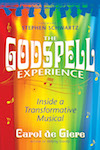Godspell Study Guide
Update on Godspell study
 The ultimate guide to Godspell is now available as a complete book The Godspell Experience: Inside a Transformative Musical. It includes a complete history of show based on the memories of original cast members and composer Stephen Schwartz. It also features a section on the concepts behind Godspell, and a chapter on each song in the musical.
The ultimate guide to Godspell is now available as a complete book The Godspell Experience: Inside a Transformative Musical. It includes a complete history of show based on the memories of original cast members and composer Stephen Schwartz. It also features a section on the concepts behind Godspell, and a chapter on each song in the musical.
Find out more at Thegodspellexperience.com/
or buy it directly from Amazon The Godspell Experience: Inside a Transformative Musical
Answers to Study Guide Questions - by Andrew Ribaudo
Andrew Ribaudo is a playwright, actor, singer, and director (to mention a few of his skills and activities). In the mid-1990s, he directed, choreographed and starred in three productions of GODSPELL, and played the "Jesus" role in two other productions. His comments are used here with permission. Other contributions of answers are welcome.
Copyright by Andrew Ribaudo, September 2000. See Music Theatre International for their thought-provoking study guides to Schwartz musicals, including Godspell.
Q. How does the score heighten the basic storyline of GODSPELL?
A. What storyline? Contrary to what many people seem to think, GODSPELL is not a book musical. There are very few plot-related elements in the script by John-Michael Tebelak. They are the baptism, the confrontation with the Pharisees, the pardoning of the adulterous woman, the Last Supper, the arrest and the Crucifixion. And even these episodes are sketchy at best. One would only know what was going on if he or she attended the play knowing some version of the story already.
To consider GODSPELL a book musical is also problematic because many people bring their own brand of theology to the show. What's going on during the baptism? What's going on during the Last Supper? What's going on during the Crucifixion? And by who's authority is Jesus acting this way? There are many different answers to these questions. It depends on whether or not one goes to church. And if so, which one?
I have often read that GODSPELL is a retelling of the last seven days of the life of Jesus. Where is this evident? When did we start marking the calendar in Christ's life during GODSPELL? If this is so, then it would seem that Jesus was baptized just one week prior to his death. The musical which depicts Christ's last seven days is called JESUS CHRIST SUPERSTAR. The synopsis by Tim Rice clearly maps out the last seven days of Christ's life, and with little mention of anything remotely theological, tells the story of the political intrigue behind his arrest and demise.
And just when did the historical Jesus enter the picture? GODSPELL is an allegory. The role originally played by Stephen Nathan represents Jesus Christ, but he isn't the actual Jesus. The role originally played by David Haskell is Stephen's 'deputy,' or perhaps his best friend. At one point David is called upon to represent John the Baptist, at another apoint he is called upon to represent Judas Iscariot, and at another point he is called upon to represent all those who arrested and crucified Christ. At one point others in the cast represent famous philosophers, at one point they represent the Pharisees of Jesus' time, at another point they represent Christ's friends and followers, and all along they are simply playing themselves and forming a community based on a basic set of enlightened (in this case, Christian, but not exclusively so) ideas.
This was more clear in the original script by John-Michael Tebelak, however the newly published script by Stephen Schwartz refers to the leading men only as Jesus and John/Judas. While many other elements of the new script are of interest, this one particular decision to rename the leading men is problematic in that it not only undermines the basic premise of the show (it being an allegory), but fosters the 30-year-old misinterpretation of the material as a plot-driven musical play with characters named Jesus and Judas.
GODSPELL is a product of an era of theatrical experimentation. It is more a performance art piece than a musical play. It is something you would expect to see in an art house somewhere way Off-Broadway rather than next door to a theater showing GUYS AND DOLLS or even PHANTOM OF THE OPERA. It has a very serious edge to it, and it has a number of very serious messages about compassion, forgiveness, community, hypocrisy and giving one's life for one's beliefs.
Back to the original question...
In general, the score is representative of the style of the stageplay. That being a mixed bag of genres, in this case ranging from vaudeville to gospel to folk to hoe-down to rock opera. I usually think of GODSPELL as something of a period piece. When I think of GODSPELL I think of flower children in an urban setting in the early 1970s. I think that this is clearly defined by the songs "Day By Day" and "Light Of The World" and most certainly by the "Long Live God" anthem. I don't believe that GODSPELL works very well when set in contemporary times. The musical score (as well as the style and content of the stageplay) would have to be reinterpreted to reflect the turn of the century. As it is published now, the music is a perfect example of Stephen Schwartz's "slightly worn-out rebel song," and I wouldn't have it any other way. That's what turned me on to the 'Schwartz Musical,' and that's what I want to hear. Stephen Schwartz wrote the book on rock musicals. He is the best in the business, and he is at his very best when he writes in this genre (for example: "Corner Of The Sky", "with You", "Father's And Sons", "West End Avenue", Lion Tamer", "Meadowlark", "Lost In The Wilderness" (both versions), "The Wasteland", "World without You" (original version), "Stranger To The Rain" and "When You Believe" just to name a few at the top of my list). He cannot be beat.
Q. How does it move the action of GODSPELL forward?
A. The score moves the action forward when dramatic action is present. As stated above, there are very few episodes from St. Matthew's (and St. Luke's, much of the well-known Biblical material comes from St. Luke, not St. Matthew) narrative that are actually dramatized in this show. "Prepare Ye" establishes the role of John the Baptist and, in a way, the dramatic action of the cast being baptized. "Save The People" simply introduces the Christ figure to the audience and to the rest of the cast. Because many of the songs are derived directly from church hymns like "Save The People," they serve only to showcase a particular singer, and perhaps (and I think this is a stretch at best) create a bond between the soloist and the Christ character. "Turn Back, O Man" is a good example of this. Many people think that the role originated by Sesame Street's Sonia Manzano represents Mary Magdalene, but this is a misconception based the song's bawdy style and the widely-held-but-absolutely-unfounded tradition in European art that Mary Magdalene was a prostitute.
On the other hand, "Alas For You" is clearly an operatic moment, as is "By My Side." At this point in the show, one begins to see traces of a plot forming or a story taking place. In "Alas For You" dramatic action takes place because there is conflict with the Pharisees. "By My Side" is a result of dramatic action having taken place, as once again the Pharisees are present and there is conflict. There can be no dramatic action without either conflict or some other event taking place. The only other piece that has dramatic purpose in this way is the Finale. In this case it is a dramatic event: the central character is dying.
One might consider "On The Willows" as a song that moves the story forward, but it is not. "On The Willows" serves only to set the mood for the 'farewell' scene. If one were to take this song out of context, the dramatic action would not be evident. This song accompanies the dramatic action that takes place at the Last Supper, but does not have a forward thrust. I would say that it is very clear that these more dramatic moments in the score (with the exception of "By My Side" of course) show Stephen Schwartz at his very best, and trying to create dramatic action in GODSPELL.
Q. What do we know because of the music that we might not know otherwise?
A. I think I have already touched upon this. The basic answer is that we know very little. I don't know of anyone who has ever popped in a CD of GODSPELL and came away understanding the synopsis of the play. One would need to know that most of the songs are detached from the little bit of dramatic action that is actually present in this show. For example, what is going on in "Bless The Lord." Ever notice that this production number not only has nothing to do with the parable that precedes it, but is also placed right in between the story and its epilogue? The line prior to the song is "You have made your money, who will get it now?" and the line immediately after it is, "Therefore, I bid you put away anxious thoughts about food and clothes..." It seems as though the speech after the song came from nowhere.
Q. How does the music contribute to our understanding of the larger themes of the show?
A. Well, the themes I mentioned earlier that I feel are clearly defined in GODSPELL are compassion, forgiveness, community, hypocrisy and martyrdom. with the exception of "AIas For You" and the Finale, I don't really see these themes being illustrated through the score. I suppose you could say that since there are back-up vocals in just about every song, there's a sense of community. But, "that's no answer to the question!"
I am sure that many people would like to think that one of the larger themes of GODSPELL has to do with a personal commitment to Jesus. In this case, each song would perhaps have something to do with a relationship with Christ. This would have to be conveyed visually for the most part, as neither the music nor the lyrics seem to focus on this theme. I personally tend not to view Christ as divine nor as a Messiah, and do not agree that this is one of the larger themes of the show. The objective in GODSPELL is not a committment to Jesus, but to his teachings. In GODSPELL, as in the Biblical epic, the Jesus character is clearly contemptuous of organized religion. It would be a disservice to the historical Jesus to represent him as the founder of such a less-than-compassionate, less-than-tolerant, less-than-charitable, less-than-forgiving organization as contemporary Christianity. That role is reserved for St. Paul.
Any other questions?
Andrew Ribaudo
AndrewRibaudo@aol.com
